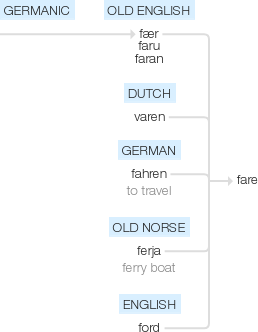Fare
Old English fær, faru ‘travelling, a journey or expedition’, faran ‘to travel’, also ‘get on (well or badly’), of Germanic origin; related to Dutch varen and German fahren ‘to travel’, Old Norse ferja ‘ferry boat’, also to ford. Sense 1 of the noun stems from an earlier meaning ‘a journey for which a price is paid’. Noun sense 2 was originally used with reference to the quality or quantity of food provided, probably from the idea of faring well or badly.
wiktionary
From Middle English fare, from the merger of Old English fær(“journey, road”) and faru(“journey, companions, baggage”), from Proto-Germanic *farą and *farō(“journey, fare”), from Proto-Indo-European *per-(“a going, passage”).
From Middle English faren, from Old English faran(“to travel, journey”), from Proto-West Germanic *faran, from Proto-Germanic *faraną, from Proto-Indo-European *por-(“a going, passage”).
Cognate with West Frisian farre, Dutch varen(“to sail”), German fahren(“to travel”), Danish and Norwegian Bokmål fare, Norwegian Nynorsk and Icelandic fara(“to go”) and Swedish fara(“to travel”).
etymonline
fare (n.)
Old English fær "journey, road, passage, expedition," from strong neuter of faran "to journey" (see fare (v.)); merged with faru "journey, expedition, companions, baggage," strong fem. of faran. Original sense is obsolete, except in compounds (wayfarer, sea-faring, etc.) Meaning "food provided" is c. 1200 (Old English also had the word in the sense "means of subsistence"); that of "conveyance" appears in Scottish early 15c. and led to sense of "payment for passage" (1510s). Meaning "person conveyed in a vehicle" is from 1560s.
fare (v.)
Old English faran "to journey, set forth, go, travel, wander, make one's way," also "be, happen, exist; be in a particular condition," from Proto-Germanic *faranan "to go" (source also of Old Saxon, Old High German, Gothic faran, Old Norse and Old Frisian fara, Dutch varen, German fahren), from PIE *por- "going, passage," from root *per- (2) "to lead, pass over." Related: Fared; faring.
